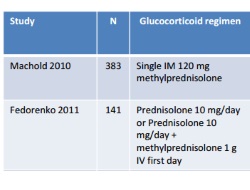Efficacy of conventional synthetic disease-modifying antirheumatic drugs, glucocorticoids and tofacitinib: a systematic literature review informing the 2013 update of the EULAR recommendations for the management of rheumatoid arthritis
Ann Rheum Dis doi:10.1136/annrheumdis-2013-204588
Systematic literature reviews were undertaken to assess the efficacy of csDMARDs, glucocorticoids and tofacitinib in the treatment of RA. The first two were updates to reviews conducted for the 2010 recommendations while the tofacitinib SLR was a complete review.Two studies identified by the csDMARD SLR, tREACH and TEAR, compared efficacy between MTX mono- and combination therapy (MTX+SSZ+HQ). Both of these studies found there was no benefit to immediate triple therapy.Further studies analysing the efficacy of csDMARDs found no data conflicting with previous findings. MTX’s efficacy as both a first and second DMARD were confirmed and one study showed MTX to be more efficacious than leflunomide. Five papers relating to four RCT’s measuring the effects of glucocorticoids were analysed. SAVE reported that a single dose of glucocorticoids showed no efficacy in halting the progression of inflammatory arthritis to RA. Other reports showed that MTX plus prednisone lead to higher rates of remission at 12 and 52 weeks as well as lower DAS and HAQ scores. The CAMERA II study reported MTX plus prednisone reduced progression of joint damage, attained remission earlier and had a significantly lower need for additional treatment. In total 10 RCT’s were analysed for tofacitinib, including the six phase III ORAL studies. In all studies tofacitinib showed more efficacy in signs and symptoms and physical function at 12, 24 and 52 weeks when compared with control groups. In ORAL Start and ORAL Scan radiographic progression was assessed. In ORAL Start, the mean change in Sharp-van der Heijde score was 0.18 at month 6 vs. 0.84 for MTX monotherapy. In ORAL Scan this was 0.3 vs. 1.0 at 52 weeks.

